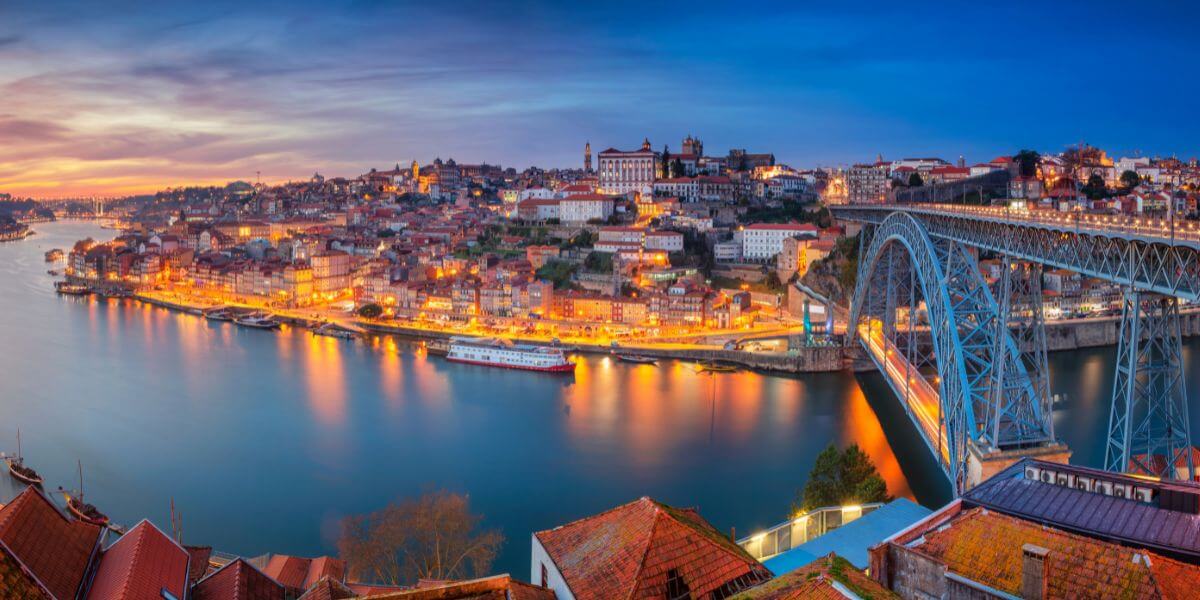Updated on dezembro 14th, 2024
Portugal D7 Visa
The Portugal D7 Visa, often referred to as the retirement visa or passive income visa, emerges as an attractive option for non-European Union citizens who wish to reside in Portugal.
Particularly popular among those seeking a higher quality of life in a country with close cultural and linguistic ties to their homeland, this visa is a pathway to a fulfilling life in Portugal.
Portugal has become a highly sought-after destination for many due to its safety, quality of life, and tax advantages. The country offers a welcoming environment, mild climate, and rich culture. For many, the ease of language and the presence of a large expatriate community make adaptation much smoother.
The D7 Visa Portugal is open to entrepreneurs, investors, and self employed individuals who can demonstrate a annual income with sufficient funds to live in Portugal.
This type of visa covers various possibilities, provided that the requirements are met, including the minimum income.
Key Takeways
Indice
Toggle- Open to entrepreneurs, investors and self employed individuals with sufficient annual income.
- Recommended to have a Portuguese bank account with at least one year’s minimum wage (€9,120 in 2023 for single applicants).
- Schengen area travel, access to healthcare, work permit, tax benefits, potential citizenship after five years.
- Required documents: Valid passport, proof of income and accommodation, travel insurance, criminal record certificate, among others.
- Two phase process: initial application in your country, followed by a residence application in Portugal.
- Specialized immigration firms will assist you with the process, ensuring compliance with Portuguese government standards
Benefits Portugal D7 Visa
Benefits of the D7 visa include visa free travel within the Schengen area, access to portuguese healthcare, work permit in Portugal, access to tax benefits and the potential for a portuguese citizenship after five years.
The Schengen Area is a group of 27 European countries that have agreed to allow visa free travel between them.
This means that a person who holds a valid visa for one of the Schengen countries can travel freely within the Schengen area without the need for additional visas.
The countries of the Schengen Area request visas for non EU nationals in order to protect their borders and to ensure that only those who are legally entitled to remain within the Schengen area are permitted to do so.
These visas are also designed to ensure that those who enter the Schengen area do not pose a threat to public order or security.
Who Can You Apply for the D7 Visa?
The D7 Visa is ideal for retirees, entrepreneurs, and anyone with a sufficient passive income to support life in Portugal. This includes income from pensions, rental properties, investment dividends, and more. Additionally, this visa offers the possibility of renewal and, eventually, conversion into permanent residency or even Portuguese citizenship, after meeting certain requirements.
Portugal D7 Visa Minimum Stay
It also requires a commitment to stay in Portugal for at least 183 days each year and recognizes the possibility of residency for retirees, pensioners and holders of own income.
This means that pensioners and holders of income, such as intellectual property (such as musicians or inventors, for example), rental income from properties, interest from investments or profits and dividends from companies, can apply for this income holder visa.
The residence authorization can be cancelled when the holder, without justified reasons, is absent from the country for a period of 6 consecutive months or 8 intercalated months, in the total validity period of the authorization. However, there are some legal exceptions.
In this article, we will delve into what the D7 Visa is, its benefits, eligibility criteria, and how you can make the most of this opportunity.
Portugal D7 Visa Requirements
To be eligible for the D7 Visa, understanding and meeting specific requirements is key. Firstly, applicants must be non-EU citizens with a regular income, sufficient to live in Portugal without the need for local employment.
The Portuguese government mandates proof of a minimum income, generally a percentage of the national minimum wage.
The Portuguese government reserves the right to request other documents in addition to those mentioned below whenever it is appropriate, and the fact that the documents necessary for the process are presented does not imply automatic granting of the visa.
Normally the following documents are requested:
- Visa application form signed by the applicant
- 2 identical, up to date photographs in 3×4 size, in good condition for identification of the applicant
- Valid passport for more than three months after the date planned for the return
- Photocopy of the passport
- Proof of regular situation if of another nationality other than the country where the visa is requested (National Registry of Foreigners – RNE) valid for 3 months after the planned date of return.
- Valid travel insurance that allows to cover the necessary expenses for medical reasons, including urgent medical assistance and eventual repatriation in case of death.
- Criminal record certificate issued by the competent authority of the applicant’s nationality country or the country where he/she has been living for more than one year (not applicable to minors under 16 years of age), with Apostille of The Hague.
- Authorization for consulting the Portuguese criminal record by the Foreigners and Borders Service (not applicable to minors under 16 years of age)
- Proof of subsistence and accommodation statement
- Document proving Income Tax Declarations
- Documents proving income from movable or immovable property or intellectual property or financial applications, such as interest, dividends or rents.
We recommend that you have a bank account in Portugal, which should have the equivalent of one year’s Portuguese minimum wage, i.e. in 2023, at least 9,120 Euros (12x 760 Euros) if you are alone.
If you want to come with other family members with you, you must follow the rule of the added values for each family member:
- 100% of the current Minimum Wage in Portugal for the Visa Holder;
- 50% of the current Minimum Wage in Portugal for adults family members to be regrouped;
- 30% of the current Minimum Wage in Portugal for minors, to be regrouped.
Application Process for the D7 Visa
The process for applying for the D7 Visa is relatively straightforward but requires attention to detail and adherence to deadlines.
Initially, submit the documentation to the Portuguese embassy or consulate in your home country. After approval and obtaining the temporary visa, you need to travel to Portugal and schedule an appointment with the Immigration and Borders Service (SEF) to convert the temporary visa into a residence permit.
During the process, keeping all documentation organized and strictly following the timelines and procedures set by the Portuguese authorities is vital. The approval of the visa will depend on the accuracy and completeness of the submitted documentation.
Portugal D7 Visa Processing Time
Understanding the processing time for the D7 Visa is crucial for planning your move. The process can be divided into several stages, each with its own timeframe:
- Application Submission: After compiling and submitting your documents to the Portuguese embassy or consulate, the initial review process can take several weeks.
- Temporary Visa Issuance: Once your application is approved, you will be issued a temporary visa, typically valid for 4 months, allowing you to enter Portugal.
- SEF Appointment: After arriving in Portugal, you must schedule an appointment with the Immigration and Borders Service (SEF) to convert your temporary visa into a residence permit. This appointment might take a few weeks to a couple of months to get scheduled, depending on the SEF’s availability.
- Final Approval: The final processing and issuance of the residence permit by SEF can take an additional few weeks.
Overall, the entire process from application submission to receiving the residence permit can take several months. It’s important to start the process well in advance and be prepared for possible delays.
Portugal Residence Permit
It is important to know that obtaining the residency permit in Portugal takes place in two different phases.
The first, takes place in your country and the second, already in Portugal.
In the first phase, outside of Portugal, you must submit the visa application and, after approval, you will receive a visa affixed to your passport with a validity of 4 months from the date of issue.
This is the period you have to leave your country and enter Portugal.
In the second phase, when you are already in Portugal, you must make the second step of the application, to become a local resident.
After acquiring the Portugal D7 Visa, upon arrival in the country, it is necessary to request from the (SEF, now AIMA) an Authorization of Residence.
Be aware that only with the correct visa you will be eligible to apply for a residence authorization in Portugal.
Normally this residence permit has a validity of 2 years.
We highly suggest that you find a reliable immigration firm when applying for a visa to Portugal.
These services will assess your situation and determine the most suitable type of visa, while making sure that your paperwork meets the standards of the Portuguese government.
Once everything is submitted, an interview is set up at the consulate to get the visa endorsed and after that, you must prepare the documents needed for the SEF interview to get your residence permit card and reunite with your family.
FAQs (Frequently Asked Questions)
What is the D7 Visa in Portugal?
The D7 Visa is designed for non-European Union citizens who have a stable passive income, such as retirees, investors, and self-employed individuals, allowing them to reside in Portugal. It enables applicants to demonstrate financial self-sufficiency without needing local employment.
What are the financial requirements for the D7 Visa?
Applicants must prove financial resources equivalent to the Portuguese minimum wage for 12 months. For 2023, this amounts to €9,120 for a single applicant. Additional requirements include 50% of the minimum wage for each adult dependent and 30% for minors.
What are the benefits of the D7 Visa?
The D7 Visa allows visa-free travel within the Schengen Area, access to Portuguese healthcare, work authorization in Portugal, tax benefits, and the opportunity to apply for permanent residency or citizenship after five years.
Who is eligible for the D7 Visa?
The D7 Visa is open to individuals with passive income, such as pensions, rental income, dividends, or intellectual property earnings. It is particularly suited for retirees, entrepreneurs, and financially independent individuals.
What documents are required for the D7 Visa application?
Key documents include a valid passport, completed visa application form, proof of income, proof of accommodation in Portugal, travel insurance, criminal record certificate, and a financial statement from a Portuguese bank showing sufficient funds.
How does the D7 Visa application process work?
The process involves two phases:
1.In your home country: Submit the initial application to a Portuguese consulate or embassy. Upon approval, a temporary visa valid for four months is issued.
2.In Portugal: Schedule an appointment with the Immigration and Borders Service (SEF) to convert the temporary visa into a two-year residence permit.
How long does it take to process a D7 Visa application?
The entire process, from the initial application to receiving the residence permit, can take several months. Timelines vary based on document completeness and SEF appointment availability.
What is the minimum stay requirement for D7 Visa holders?
D7 Visa holders must reside in Portugal for at least 183 days annually. Absence for six consecutive months or eight non-consecutive months within the visa’s validity period can lead to its cancellation unless exceptions apply.
Can family members accompany a D7 Visa holder?
Yes, the D7 Visa allows family reunification. Financial requirements increase based on family size: 50% of the Portuguese minimum wage for each adult dependent and 30% for each minor.
Does the D7 Visa lead to Portuguese citizenship?
After five years of legal residence in Portugal with a D7 Visa, holders can apply for permanent residency or Portuguese citizenship, provided they meet the legal requirements.
Why should I hire a specialized lawyer for my D7 Visa application?
Working with an immigration lawyer ensures compliance with Portuguese legal standards, streamlines the process, and increases the likelihood of a successful application by assisting with documentation and SEF procedures.
Conclusion
The Portugal D7 Visa stands as an ideal option for individuals seeking a haven in Europe, offering a perfect blend of quality of life, safety, and cultural and social opportunities.
Through this visa, retirees, business owners, and those with adequate passive incomes can not only reside in Portugal but also fully immerse in its rich culture and lifestyle.
This article provided a comprehensive guide on the D7 Visa, covering everything from eligibility and application process to life in Portugal after obtaining the visa.
With proper documentation, a clear understanding of the process, and a positive outlook, the path to a new life in Portugal can be smooth and fulfilling.
For those dreaming of living in Portugal, the D7 Visa represents a gateway to an enriching life experience. With its numerous benefits, including access to high-quality healthcare, educational opportunities, and the ability to work or start a business, this visa is an excellent choice for those wanting to explore what Portugal has to offer.
Working with a specialized lawyer ensures that you receive quality support from the beginning of the application, including the assessment of the documents required, the visa application and the completion of the procedure with the residence permit card in Portugal.
Do you want to know about the most common issues about global mobility in Portugal?
Schedule a call with one of our lawyers in Portugal clicking in the button below to find out which portuguese visa is most suitable for you.
d7 visa portugal, d7 visa, visa d7 portugal, d7 visa, income visa portugal, visa for pensioner portugal


